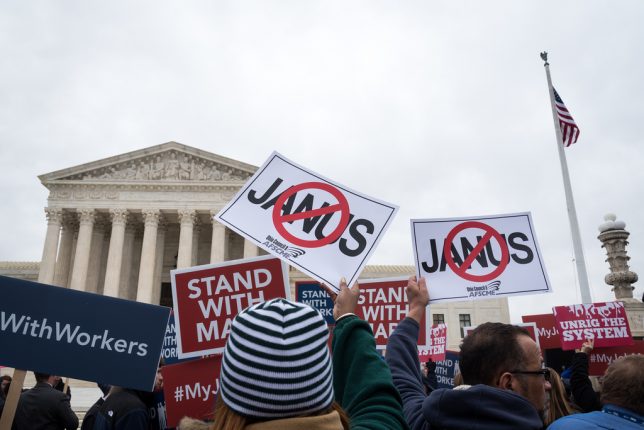Labor Watch
Justice Alito Made His Ruling, Now It’s Time to Enforce It


Since the Janus v. AFSCME Supreme Court ruling gave state and local government workers the right to refrain from paying for union representation, unions have not given up their power to collect compelled dues quietly. Whether by refusing to inform employees of their Janus rights, using friendly state legislatures to pass laws that replicate or enshrine their previous privileges, or using deceptive payroll deduction procedures, government worker unions are challenging the enforcement of Janus’s requirement that employees “affirmatively consent” to make payments to the union.
My colleague Patrick Esch outlined one of the more egregious efforts by unions to exploit friendly state legislators to push back against Janus—Washington state has proposed exempting unions from state-level liability incurred from improper dues collections, and Oregon and New York have proposed taking money that would give raises to government employees and instead give it to labor unions. Additionally, unions in Washington would be given a free slate to enforce their narrow “window periods” to withdraw dues authorizations.
These efforts show that enforcing the Janus rights will not be a matter of sitting and waiting. And thus it has fallen to conservative organizations, most prominent among them the Freedom Foundation operating on the West Coast, to advocate, litigate, and legislate to ensure that unions respect employee rights.
On the litigation front, the Freedom Foundation sued the California Teachers Association last week on behalf of five teachers who wish to withdraw their membership and dues payments from the union but are prohibited from doing so because of fine print in authorization cards the union made them sign before the decision was finalized. Those cards limit withdrawals of dues payments to a brief annual window, a common practice for unions not only in California but nationwide.
But such windows appear to contradict the Janus ruling, which held that “Neither an agency fee nor any other payment to the union may be deducted from a nonmember’s wages, nor may any other attempt be made to collect such a payment, unless the employee affirmatively consents to pay.” So, the Freedom Foundation and the teachers filed suit to invalidate the dues authorizations; ideally, all pre-Janus dues authorizations would be invalidated because employees were never informed that their authorization waived the employee’s First Amendment rights.
Other organizations are pressing even further. Ohio’s Buckeye Institute, with support from the Cato Institute, Freedom Foundation, Goldwater Institute, and Pacific Legal Foundation, are making a bold challenge against government worker monopoly bargaining. Janus allowed dissenting government workers to refrain from funding unions, but continues to subject them to union representation. While unions whine about having to represent so-called “free riders,” monopoly bargaining is in fact a privilege to the union as an institution, which is why unions resist efforts to permit “open shops.” In a case titled Uradnik v. Inter Faculty Organization, a Minnesota college professor hopes to escape union representation she does not want.
While Janus was a victory for workers, Supreme Court rulings do not enforce themselves—especially when multi-million-dollar special interests with a major political party carrying out their bidding stand to lose revenue.



